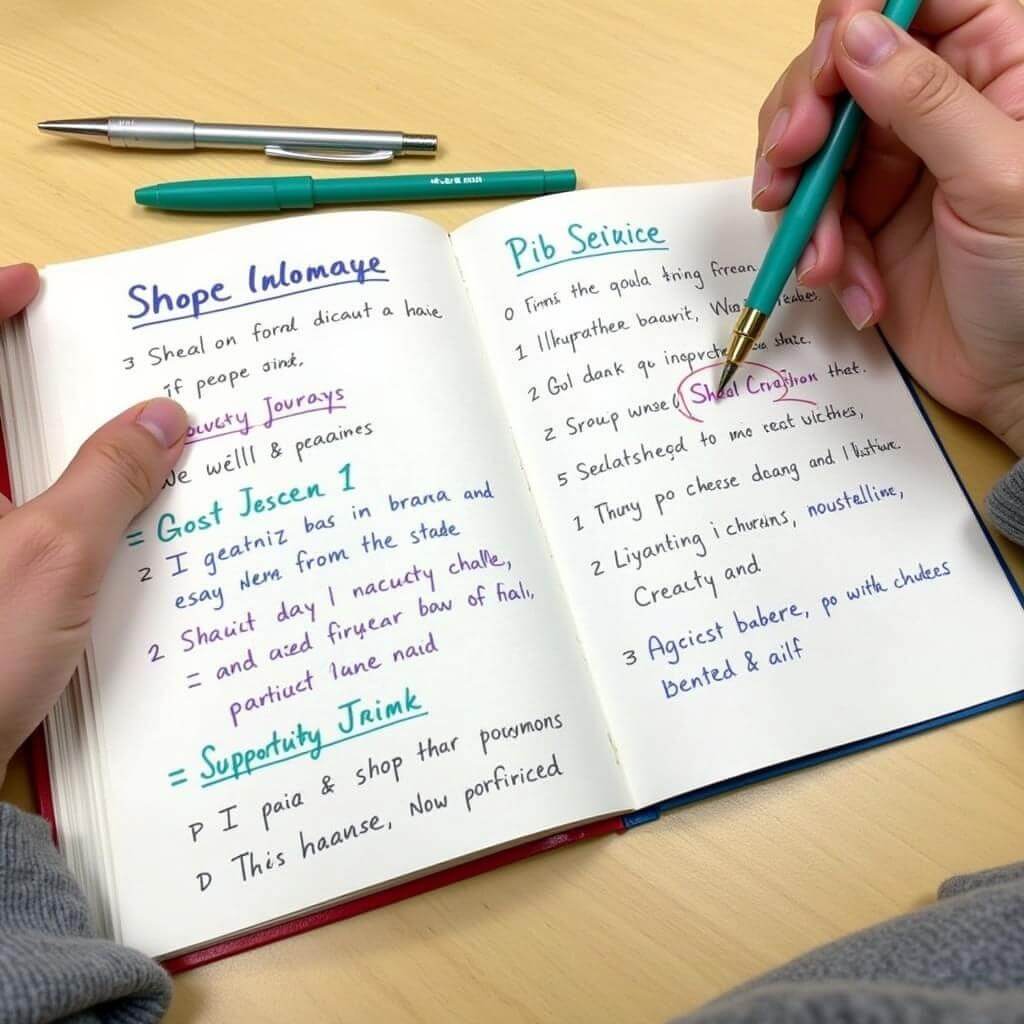Academic discussions form a crucial component of the IELTS Listening test, often appearing in Section 3. Mastering this skill is essential for achieving a high score. As an experienced IELTS instructor, I’ll share effective strategies to help you excel in this challenging aspect of the exam.
Understanding Academic Discussions in IELTS
Academic discussions in IELTS typically involve two to four speakers discussing a topic related to university life, research, or academic projects. These conversations are designed to test your ability to comprehend complex ideas, follow arguments, and identify key information in a formal academic context.
Handling fast-paced audio sections is crucial when dealing with academic discussions, as speakers often exchange ideas rapidly and use sophisticated vocabulary.
Key Features of Academic Discussions
- Multiple speakers with distinct viewpoints
- Specialized vocabulary and academic terminology
- Complex ideas and abstract concepts
- Formal language and academic expressions
- Debate-style arguments and counterarguments
Effective Strategies for Practicing Academic Discussions
1. Familiarize Yourself with Academic Topics
Expose yourself to a wide range of academic subjects to build your background knowledge. This will help you better understand the context of discussions you encounter in the test.
Examples of common academic topics:
- Environmental studies
- Psychology and human behavior
- Technological advancements
- Historical events and their impact
- Scientific research methodologies
2. Develop Active Listening Skills
Practice active listening by focusing intently on the speakers and their arguments. Try to anticipate what might be said next based on the context of the discussion.
Improving attention during group listening is essential for following complex academic conversations with multiple participants.
3. Enhance Your Note-taking Abilities
Effective note-taking is crucial for capturing key information during academic discussions. Develop a system of shorthand and symbols to quickly jot down important points.

4. Practice with Real IELTS Materials
Use official IELTS practice tests and past papers to familiarize yourself with the format and difficulty level of academic discussions in the exam.
Example from an IELTS Listening test:
You will hear two students discussing their research project on climate change.
Student A: So, for our environmental science project, I think we should focus on the impact of rising sea levels on coastal ecosystems.
Student B: That's an interesting idea, but don't you think it might be too broad? What if we narrowed it down to a specific region or type of ecosystem?
Student A: You have a point. Maybe we could concentrate on coral reefs in the Great Barrier Reef?
Student B: That sounds more manageable. We could analyze the data on coral bleaching events over the past decade and correlate it with sea temperature rises.5. Improve Your Academic Vocabulary
Build your academic vocabulary by reading scholarly articles, attending lectures, and using vocabulary-building apps focused on academic English.
Key academic phrases to listen for:
- “In contrast to…”
- “Furthermore…”
- “It can be argued that…”
- “The evidence suggests…”
- “To summarize…”
Recognizing important details quickly becomes easier when you’re familiar with academic language and can identify key phrases and transitions.
6. Practice Identifying Speaker Opinions and Attitudes
Pay attention to the tone of voice, stress patterns, and language used by speakers to convey their opinions and attitudes towards the topic being discussed.
Examples of opinion indicators:
- “I strongly believe that…”
- “In my view…”
- “I’m not entirely convinced by…”
- “It seems to me that…”
- “I tend to agree/disagree with…”
7. Enhance Your Concentration and Focus
Develop techniques to maintain concentration during long listening passages. This could include meditation, mindfulness exercises, or simply practicing listening to extended academic discussions without distractions.
Focusing on key details is crucial when listening to lengthy academic discussions, as it helps you filter out less important information.
Common Mistakes to Avoid
-
Getting distracted by unfamiliar words: Don’t fixate on words you don’t understand. Focus on the overall context and main ideas.
-
Failing to follow the conversation flow: Practice identifying transitions between speakers and topics to avoid losing track of the discussion.
-
Neglecting to read questions beforehand: Always read the questions before the audio begins to know what information to listen for.
-
Writing too much: Avoid writing full sentences. Use concise notes to capture key points quickly.
-
Missing nuanced opinions: Pay attention to subtle language that indicates agreement, disagreement, or uncertainty among speakers.
Practical Exercises for Improvement
-
Shadow listening: Listen to academic podcasts or lectures and try to repeat what you hear in real-time to improve your processing speed.
-
Transcription practice: Listen to short segments of academic discussions and attempt to transcribe them word-for-word. This helps train your ear to catch every detail.
-
Prediction exercises: Pause academic discussions at key points and try to predict what will be said next. This helps develop your understanding of academic discourse patterns.
-
Debate analysis: Watch academic debates and focus on identifying main arguments, supporting evidence, and counterpoints.
-
Timed note-taking: Practice taking notes on academic talks within strict time limits to simulate exam conditions.
Improving response time in listening is crucial for success in the IELTS test, and these exercises can significantly enhance your speed and accuracy.
Conclusion
Mastering the skill of listening to academic discussions for IELTS requires consistent practice and a strategic approach. By implementing these techniques and avoiding common pitfalls, you’ll be well-prepared to tackle this challenging aspect of the IELTS Listening test. Remember, the key to success lies in regular practice with authentic materials and a focus on developing your academic English skills. Keep refining your strategies, and you’ll see significant improvement in your ability to comprehend and analyze complex academic discussions.